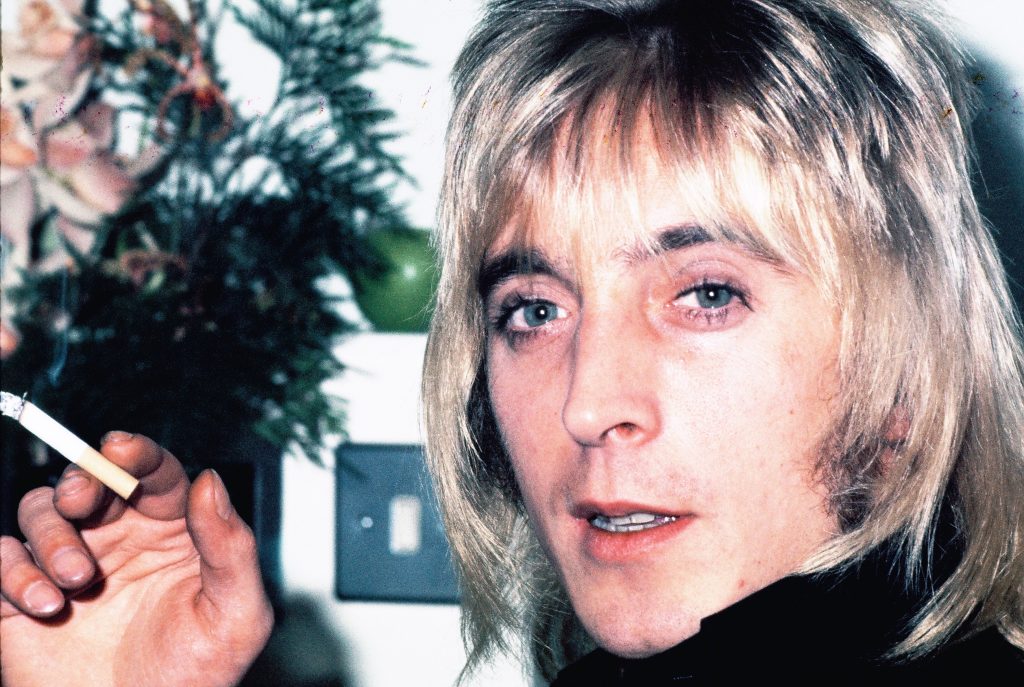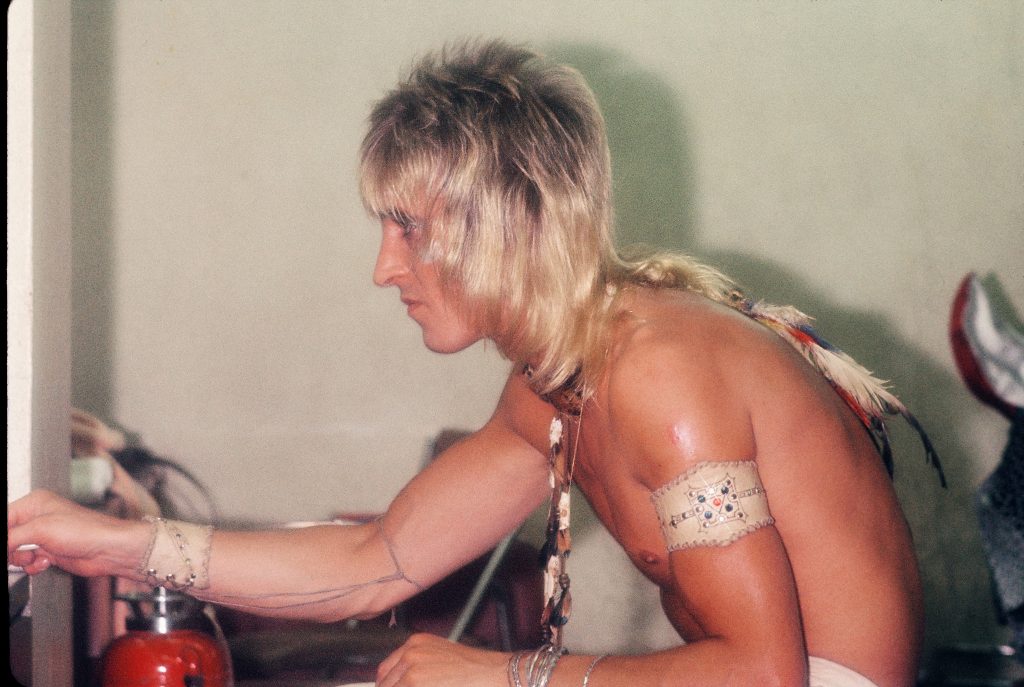The MainMan group of companies was a rights management organization formed by entrepreneur and impresario Tony Defries in 1972, that supported and helped to develop the careers of various artistes including David Bowie, Iggy Pop, Lou Reed, Mick Ronson, Mott the Hoople, Ian Hunter, Mick Ralphs, Dana Gillespie, Amanda Lear, John Cougar Mellencamp and many others.


Tony first met Bowie in 1970, at a low point in David’s career where he was looking for a new manager with the ability to help him escape the theatrical mime vaudeville niche he was in and achieve the rock stardom he craved. Tony was the first to recognize David’s real potential and agreed to work with him. He began by extricating David from his recording, writing and publishing contracts and created a a new structure that would allow David the freedom to explore his creativity while Tony focused on the business affairs.
Over the next four years Tony took David from an unfocused dilettante to a superstar with the success of the albums Man Who Sold the World, Hunky Dory, The Rise and Fall of Ziggy Stardust and the Spiders from Mars, Aladdin Sane, Pinups, Diamond Dogs and Young Americans. While mining a period of creative brilliance Bowie also wrote and produced All The Young Dudes which became a huge hit for Mott The Hoople in July 1972, after which Tony teamed Bowie and Mick Ronson to produce Lou Reed’s album, Transformer, which became a huge international best seller. Together Tony and David enjoyed a high octane ride that defined the ‘70’s rock ‘n roll excesses.
Tony’s career in the music industry began in 1964. While working as a solicitor’s clerk for a London based law firm he met and represented acclaimed producer Mickie Most in a number of disputes involving various hit recordings. That same year Mickie was approached by Allen Klein, an American music business manager, who had come to England to try and sign up Mickie, The Rolling Stones, The Beatles and Donovan. Mickie asked Tony to “come and check this geezer out” and that meeting led to the formation of Mickies own very successful independent label Rak Records. Tony continued working with Mickie for several years advising him on projects with The Animals, Brenda Lee, Donovan, Herman’s Hermits, Nashville Teens, The Seekers, Jeff Beck, Jimmy Page, John Paul Jones, The Yardbirds, Arrows, LuLu and many more. Tony continued to work with Klein on The Rolling Stones and The Beatles until Klein became their business manager with the exception of Paul McCartney.
Defries also worked with actors, designers, illustrators, theatrical and television directors, producers, scriptwriters and photographers to resolve their creative copyright and licensing issues. He advised Don Silverstein, an American photographer living and working in London, who had taken iconic photographs of Jimi Hendrix that were being used without Don’s permission by retaining his rights and related revenues. Tony was subsequently approached by a group of photographers including Brian Duffy, David
Bailey, Terence Donovan and Antony Armstrong-Jones to assist them and others in resolving rights and related issues. Tony formed what would become the Association of Photographers. He would later commission Brian Duffy to create the iconic concept for the cover of Aladdin Sane and Terry O’Neill to shoot the Diamond Dogs album cover. He also commissioned Justin de Villeneuve to shoot Bowie & Twiggy for the cover of Vogue and when the magazine declined to put a man on the cover Tony repurposed that iconic image for the album Pinups.
In 1964 Defries and Laurence Myers began began working together informally with prominent British performers, producers and songwriters including Mickie Most, Mike Leander, Geoff Stephens, Peter Eden, Barry Mason, Roger Cook, Mike D’abo, Donovan, Roger Greenaway, Lionel Bart, Stevie Marriot, New Seekers, Hollies, Graham Nash, Faces, Small Faces and Tony Macaulay, whose 1970 case against his publishers Schroeder Music Publishing vs Macaulay, led by Defries, was resolved in Macaulay’s favour in the House of Lords in 1974 and changed UK copyright law forever. Myers was an accountant whose clients included Rod Stewart, The Rolling Stones and many other entertainment figures. When they needed assistance with creative property rights Myers would turn to Tony.
In 1969 Tony and Laurence formalized their relationship by creating the GEM Music Group, an independent record label, music publisher, rights management and personal/business management company, unique for the time. GEM’s first release was Love Grows Where my Rosemary Goes written and produced by Tony Macaulay performed by Edison Lighthouse which topped the UK Singles Chart in 1970. That year Olav Wyper, the head of Philips UK, Bowie’ s record company at the time, recommended David to Defries, knowing that David was dissatisfied with his manager Ken Pitt and needed help. Defries immediately realized David’s potential, so he arranged the struggling musician’s extraction from all his existing contracts and signed him to a personal management agreement and recording/songwriting contracts with GEM. Defries took a risk on an unknown artist. He believed Bowie was going to be a star, made it happen and created a “magical aura, a cocoon in which David could create”. Tony would also go on to sign Iggy Pop, Dana Gillespie and Mick Ronson to GEM.
In 1970 Defries was approached by Don Powell Hunter, a producer and songwriter who had worked closely and co-written songs with Stevie Wonder at Motown. Stevie had asked Don to look for an independent advisor who could help him improve his situation with Berry Gordy or leave Motown when he turned twenty-one. For the next nine months Defries worked closely with Stevie in secret to explore his options and ultimately arranged for Stevie to recover control of his music, recordings and publishing when he decided to remain with Motown.
In 1971 Tony and Mike Leander attempted to revive Marianne Faithfull’s career by producing a solo album for her called Rich Kid Blues and managing her through a difficult attempted rehab which ultimately failed. The album was shelved and released in 1985 after her breakthrough Broken English album in 1979. In 1973 MainMan produced The 1980 Floorshow at the Marquee Club a famous rock venue in SoHo London for a Bowie Midnight Special on NBC featuring Marianne as a nun in a backless costume and Amanda Lear.
In 1971, Defries decided that breaking Bowie in the US would require a permanent corporate presence and suggested to Laurence that they open offices in New York.
By that time GEM had established a significant position in the UK industry and Myers was uncomfortable about risking that base in a new US venture, so Tony and Laurence reached an amicable agreement which in return for a financial settlement would allow Defries to keep certain artists while the rest remained with GEM. Tony took David Bowie, Iggy Pop, Mott the Hoople, Dana Gillespie and Mick Ronson, forming the MainMan Group of Companies. The original MainMan team was made up of members of Andy Warhol’s Factory, including Cherry Vanilla, Tony Zanetta, Leee Black Childers and Jamie Andrews along with in house photographer Mick Rock.
Tony’s vision for MainMan and his aggressive promotional and marketing focus drove David’s transformation into one of the biggest rock stars in the world. By 1974 David was enjoying enormous success, but problems caused by his growing reliance on drugs during the recording of Diamond Dogs and the supporting tour caused a deterioration in the working relationship with Tony that would eventually lead to a breakdown in 1975 when the parties reached a settlement that determined the ongoing management of their joint interests. MainMan continued to work with Mick Ronson, Dana Gillespie and Iggy Pop and fostered new talent like Cindy Bullens, John Mellencamp, Sandy Dillon and others.





